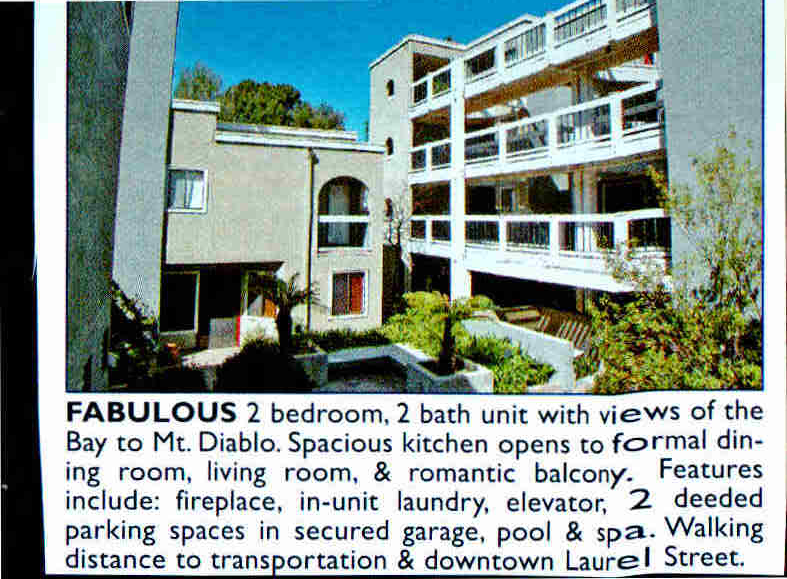How product marketers are often like bad real estate agents
OK, true confessions. I lust after real estate. When it comes to gawking at beautiful homes and all the fantabulous things in them, I am totally into it. And when I go away for the weekend, I am prone to fantasizing about buying a vacation home or even just flat-out relocating... leaving behind the Silicon Valley rat race and all that.
Anyway, recently I was in a coffee shop in a GORGEOUS California locale (Pacifica) and I picked up the local copy of the ubiquitous Homes and Land magazine, and started skimming the listings.
But flipping through the pages, I quickly got frustrated and irritated. And then I remembered that I ALWAYS get irritated whenever I look at offline real estate advertisements.
Here's some examples of my frustration, from the Homes & Land for San Mateo County, which covers a huge swath of the Bay Area: everything between San Francisco and Palo Alto, including the coast (Half Moon Bay and Pacifica). FYI, none of these ads contained a URL with more info.
Example 1: No Location

Wow. Looks like a great place, but WHERE THE HECK IS IT? What city? The ad even touts the awesome location and its convenience to both San Fran and the South Bay. BUT WHERE THE HECK IS IT? There are no clues on the entire page.
Example 2: Neighborhood name only known to real estate agents

OK, maybe this is slightly better. A location, "Crestview", is mentioned. But, again, WHERE THE HECK IS IT? You can't find Crestview on a map -- it's not the name of a town. Unless you lived there you would not know the esoteric name of this neighborhood. (BTW, I have since learned that this is the name of a condo development in the town of San Carlos.)
Example 3: Which town? And what's the price?

Double Trouble here. No town mentioned (guess you're supposed to intuitively know which Laurel Street this ad refers to) AND no price listed. Why even bother looking at this ad? NEXT.
Example 4: How many bedrooms and baths?

Yay, the location is mentioned! But how many bedrooms and baths does this place have? No way we're going to make Grandma share a room with the kids!
Real estate agents, please don't waste my time
Seriously, what is it with real estate agents and the information-free way so many of them advertise? They seem out of touch with the way people buy homes. There are a few "screening questions" that EVERY home buyer wants to know about a home before putting forth special effort to see (or further research) that home:
-
WHERE is the home? At minimum: what town is it in? Better: what town, area of town, and school district is it in? Best: what's its address, so Google Maps can tell me if it is near everything important to my family: workplace, schools, activities,...? (Keep in mind that many people are unfamiliar with the "neighborhood names" that Real Estate agents use, including the neighborhood's residents. Thus, the town name should ALWAYS be included.)
-
Is the home big enough for my family? How many bedrooms and baths? How many square feet?
-
What's the asking price? Yes, we all understand the price is negotiable. But give the reader a clue as to whether he/she can even come close to affording the home.
When I see ads that neglect to include this information, I get irritated. And I know I'm not the only one. In general, buyers do NOT want to waste their time calling you, talking to you, and visiting you if you do not meet their minimum screening criteria. You'll just piss them off if you try to force it.
Preschools Too
Real estate pros are not the only ones who seem to have no clue as to what's important to potential buyers. I have been searching for preschools for my son and stumbled across this website: http://www.losgatospreschool.com/
It's quite a spiffy website with animation, groovy music, photos of attractive children, and everything. But with the exception of the school's location, the website fails to provide answers to the basic screening questions that EVERY parent needs to know when looking for preschools.
-
Does my child qualify? What ages are the kids? What's the birthday cut-off? Do the kids need to be fully potty trained?
-
Is the preschool located near my home or work?
-
Does it fit with my work schedule? Is the pre-school program full-time or part-time? Does it go year-round? What hours does it operate? Does it require parents help onsite during the weekdays (not good for working couples)? What holidays does it take off?
-
Can I afford it? What's the tuition?
Why, oh why, can't anyone just simply answer my initial screening questions? Why even bother paying for an ad or a web presence if you are unwilling to tell the potential buyer what he/she needs to know up front?
So what does this have to do with product marketing?
In many ways, technology products are no different than preschools or real estate.
Our potential buyers visit our websites, they attend our events, they read our magazine ads, they flip through our brochures. But about 75% of the time they are left not knowing what THE HECK our products are or what they actually do, never mind the answers to their basic screening questions. We make it so damn hard on them.
Why does this happen? Because too often, we product marketers and product managers:
-
Don't know who the buyers actually are. Maybe we should try developing some buyer personas or do some research about the purchasing decision. How about that?
-
Have NO CLUE about buyers' initial screening questions. Granted, the questions are often not as obvious for tech products as they are for homes or preschool - but not always. Sometimes we product managers/marketers are just over-educated about our products and technology. Like the real estate agent who forgets that no one except real estate agents knows where "Crestview Park" is, we forget that many potential buyers don't know our industry jargon. And though the benefits of each feature seems obvious to the PM, we forget that potential buyers don't get it. We forget that the superiority of our base technology is almost never one of their core buying criteria.
-
DELIBERATELY don't answer their questions, in hope that a particularly stupid customer might be duped into buying something that doesn't meet his screening criteria.
This is also officially called "Being a Spineless Weasel." It really irritates meand is the reason why the Internet is full of meaningless, watered-down descriptions of companies and products. In the end, this makes prospects mad, generates crappy and unqualified leads, and wastes the time of sales people. All because the company's marketers are too spineless to honestly admit they DON'T do something.
- Are too lazy to truly answer the questions. Instead of finding out what the screening questions of potential buyers are and answering them clearly, we too often stick to the -- duh! -- stupid and obvious. ("Our product lifecycle management system helps you manage the lifecycle of your products"). Or we think we're speaking to the buyer's problem if we stick a trite phrase like "increases ROI", "improves efficiency", or "adds value" to our descriptions. But these are just unbelievable claims unless there is a readily apparent premise.
An example from IBM: Content Management - Activate content with processes. Add value and transform your business -- uh, ok, you can UTTERLY TRANSFORM my business by letting me "activate content" (whatever that means) - REALLY?
Do something about it
We need to do a better job. Sometimes I find myself utterly ashamed for the Entire Profession when I read the marketing nonsense I find on software company's websites.
Please, please. Let's all do something about it. Let's make it easier on our customers.
Develop some buyer personas. Instead of assuming you know your target buyers' screening questions, try asking some people in your target market who AREN'T customers (aka "potentials"). Find people via trade shows, LinkedIn, online forums, your friends, your family, Twitter, whatever. Ask lots of questions. The buyers' screening questions are often not as complicated as you think. And once you get the questions, clearly and honestly answer them in your marketing materials. Especially on your website.
Stop making it so hard for your customers to figure out what you do.
It's not easy, but who said Product Marketing was?
And now I shall resume my regularly scheduled real estate gawking.
In the comments, please share your tips for locating new potential buyers and finding out their initial screening questions!!!
=======
Note 1: OK, you're going to tell me that these magazines are not actually designed to sell the houses advertised; their purpose is to sell the AGENT. Fair enough. But I think that such ads makes the agents look out-of-touch and like poor marketers, and are thus spectacularly ineffective.